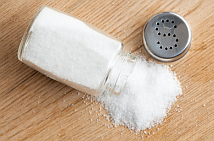NCD Watch
Too Salty for Health
29 Aug 2011 (Mon)
 Salt (sodium chloride), a mineral composed of 40% sodium and 60% chloride, is the major source of sodium in our diet. Eating too much sodium can increase blood pressure, which in turn increases the risk of stroke, coronary heart disease, heart failure and renal disease.
Salt (sodium chloride), a mineral composed of 40% sodium and 60% chloride, is the major source of sodium in our diet. Eating too much sodium can increase blood pressure, which in turn increases the risk of stroke, coronary heart disease, heart failure and renal disease.
The Behavioural Risk Factor Survey April 2010 of the Department of Health telephone-interviewed over 2 000 community-dwelling people aged 18 - 64 in Hong Kong and asked them how many days a week on average they ate snacks with high salt content in the 30 days before enumeration (examples of these snacks include potato chips, prawn crackers, squid floss, dried pork jerky, snack type seaweeds or traditional Chinese preserved fruits, etc.). Results showed that 34.3% of the respondents consumed snacks with high salt content at least one day a week, in which 3.1 % of them reported that they consumed 4 days or more a week. Females (3.6%) and people aged 18 - 24 (6.7%) were more likely than their counterparts to report having consumed snacks with high salt content 4 days or more a week.
For healthy adults, the World Health Organization (WHO) and the Food and Agricultural Organization (FAO) of the United Nations recommend sodium consumption of less than 2 000 milligrams (mg) a day. This is equivalent to consumption of less than 5 000 mg (or approximately 1 teaspoon) of salt a day. Click here for more information about salt and some suggestions for keeping salt intake in check.






































